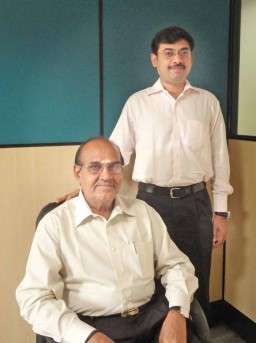Committed to being a sustainable company, Tirupur based Armstrong Knitting Mills is moving ahead with plans to convert its garmenting units into 100 per cent dedicated organic production capacity. The spinning operations of the vertically integrated company are already completely organic, as is the knitting capacities. With a group turnover of around Rs. 160 crore (US $ 32 million), the garmenting division accounts for a turnover of Rs. 70 crore (US $ 14 million) and is the growth engine for the company for the next few years.

“It has not been easy to stay true to our commitment on organic, as fluctuating cotton prices made it difficult to keep prices steady when consumers were looking for ‘cheaper options’,” says P Vivek Anand, Executive Director, Armstrong. However, the company has not deviated from its goal and is today working towards being an internationally recognized company for its sustainable work environment, production processes and product offerings. Interacting with Team Apparel Online, Vivek Anand and E. Palanisamy, Group Chairman is very upbeat of their chosen path, confident that it will give them growth even during the slowdown.
Facing global economic slowdown head on, Armstrong has continued to register growth, expecting to see 15 per cent increase in turnovers in the garment division. “It has been a two-way story, while one segment of the consumers held back to opt for better priced goods only for quality, there is a large segment who wants to spend on value, since they are buying less the focus is on value of the products,” says Anand. The ‘value’ segment of customers has kept the market for organic cotton moving despite all odds. It has also helped that the company is C&A approved for organic cotton and the retailer is positioning itself strongly as a sustainable player.
With 900 machines spread out over two manufacturing units, the company is currently producing around 20,000 T-shirts per day. While the production for adults is more basic, detailing is applied on kids’ garments. “In organic cotton, buyers like to keep the product simple giving a natural feel, as the value is not ornamentation but the composition. However, in kids clothing we do embroidery and prints to enhance the look,” says Vivek. As most of its buyers want more organic products from them, the sewing facilities are being converted into organic lines and over the next two years, Armstrong is aiming to be a 100 per cent organic producing company from spinning to final product.

Not looking for expansion at this point of time, Armstrong is instead investing in upgradation of technology for better productivity and compatibility to the latest needs. “With new dyes coming in for organic products, it is important to have printing machines that are compatible to these chemicals, so as a first step we are modernizing our printing capabilities,” informs Vivek. While spinning and knitting facilities are automated, sewing lines are largely labour-oriented as they have permanent labour that is very motivated. The company is currently in the process of implementing 5S to reduce wastages.
Having understood that today, the corporate strategies could be built not only on differential competitiveness, but also in adopting sustainable initiatives including social and environmental commitments; the company has invested in wind mills for its captive energy needs. The company is also involved in many CSR activities with focus of education, including community education programmes and schools for kids. The spinning units give employment opportunities to many villages and Armstrong is involved in making their lives better.
“The environment is also a concern and we do our bit to practice and teach the communities that we work in about the importance of preserving the natural resources, specially water, which is at a premium,” says Vivek. In fact, Armstrong was not affected by the closure of the processing units in Tirupur because of the honourable High Court’s order for pollution control, as it has invested in an ETP plant, which is compliant to required standards.
The real challenge in organic today, according to Armstrong is responding to buyer enquiries as quickly as possible. “Earlier buyers sourced at a more relaxed pace and picked up complete collections, but today we get flash enquiries on styles and it is important to be able to deliver to retain the buyers. For that we have started to keep grey organic fabric in ready stock so that the lead time is only the production cycle,” informs Vivek.
In garments, the company is looking at new markets and is participating at the Japan garment fair this year. “After all many of our buyers are supplying organic garments to the Japanese market in good volumes, so obviously a market does exist and we want to explore the option. Also it helps that now Indian exporters have the duty-free advantage,” reasons Vivek.
Producing 14 tonnes of organic yarn per day, Armstrong is exporting the same to Korea and Bangladesh. Going forward Bangladesh is an important market as the demand has been rising steadily. “We are looking at Bangladesh as a growth market, but the only dampener is price, we are working on this to capitalize on the huge potential that exists,” says Vivek.
Biding high on its sustainable character, Armstrong Knitting Mills is armed with many certifications including Fair Trade, GOTS, EU Ecolabel, SA 8000 and Oekotex, which according to Vivek not only add to the credibility of the company but also make it a preferred supplier in the category. “We are on the advisory board of Control Union and international organizations look up to us as truly sustainable, which gives our efforts bigger impetus to continue on the path and realize the dream to be India’s first 100 per cent sustainable textile company,” concludes Vivek.

Leave a Reply